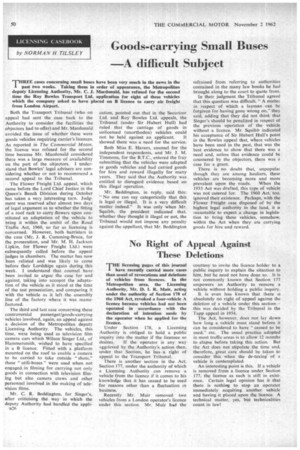Goods-carrying Small Buses A difficult Subject
Page 52

If you've noticed an error in this article please click here to report it so we can fix it.
'THREE cases concerning small buses have been very much in the news in the L past two weeks. Taking them in order of appearance, the Metropolitan deputy licensing Authority, Mr. C. J. Macdonald, has refused for the second time the Roy Bowles Transport Ltd. application for eight of these vehicles which the company asked to have placed on B licence to carry air, freight from London Airport.
Both the Transport Tribunal (who on appeal had sent the case back to the Authority to consider the facilities the objectors had to offer) and Mr. Macdonald avoided the issue of whether these were goods vehicles requiring carrier's licences. As reported in The Commercial Motor, the licence was refused for the second time because Mr. Macdonald considered there was a large measure of availability on the part of the objectors. I understand that Bowles' legal advisers are considering whether or not to recommend a second appeal to the Tribunal.
The Flower Freight Ltd. appeal, which came before the Lord Chief Justice in the Queen's Bench Division during October has taken a very interesting turn. Judgment was reserved after almost two days of legal argument as to whether the fitting of a roof rack to carry flowers upon constituted an adaptation of the vehicle to bring it within the ambit of the Road Traffic Act, 1960, so far as licensing is concerned. However, both barristers in the case (Mr. I. R. Cumming-Bruce, for the prosecution, and Mr. M. H. Jackson Lipkin, for Flower Freight Ltd.) were subsequently called before the appeal judges in chambers. The matter has now been relisted and was likely to come before their Lordships again during this week. I understand that counsel have been invited to argue the case for and against, taking into accopnt the adaptation of the vehicle as it stood at the time of the test prosecution, and comparing it with the vehicle as it left the assembly line of the factory where it was manufactured.
The third and last case concerning these controversial passenger/goods-carrying vehicles involved, again, an appeal against a decision of the Metropolitan deputy Licensing Authority. The vehicles, this time, were being used as television film camera cars which Wilson Singer Ltd., of Hammersmith, wished to have specified in a B licence. Fitted with a platform mounted on the roof to enable a camera to be carried to take outside "shots," these " utili-buses " were used when not engaged in filming for carrying not only goods in connection with television filming but also camera crews and other personnel involved in the making of television films.
Mr. C. R. Beddington, for Singer's, after criticising the way in which the deputy Authority had handled the appli
B26
cation, pointed out that in the Securicor Ltd. and Roy Bowles Ltd. appeals, the Tribunal (under Sir Hubert Hull) had ruled -.that the carriage of goods in unlicensed (unorthodox) vehicles could
not be held against an applicant. It showed there was a need for the service.
Both Miss E. Havers, counsel for the independent respondents, and Mr. J. M. Timmons, for the B.T.C., entered the fray submitting that the vehicles were adapted as goods vehicles and had carried goods for hire and reward illegally for many years. They said that the Authority was entitled to disregard evidence based on this illegal operation.
Mr. Beddington, in reply, said this
No one can say categorically that this is legal or illegal. It is a very difficult matter indeed," It was only when Mr. Squibb, the president indicated that. whether they thought it illegal or not, the Tribunal would not impose any penalty against the appellant, that Mr. Beddington
refrained from referring to authorities contained in the many law books he had brought along to the court to quote from.
In their judgment the Tribunal agreed that this question was difficult. "A matter in respect of which a layman can be forgiven for having gone wrong on," they said, adding that they did not think that Singer's should be penalized in respect of the previous operation of the vehicle without a licence. Mr. Squibb indicated his acceptance of Sir Hubert Hull's pOint in the Bowles appeal that, where vehicles have been used in the past, that was the best evidence to show that there was a need and, unless that evidence could be countered by the objectors, there was a case for a grant.
There is no doubt that, unpopular though they are among hauliers, these vehicles are becoming more and more
prevalent upon the roads. When the 1933 Act was drafted, this type of vehicle was not catered for. The 1960 Act, too: ignored their existence. Perhaps, with the Flower Freight case disposed of by the highest legal authority in the land, it is reasonable to expect a change in legislation to bring these vehicles, somehow, within the Act when they are carrying goods for hire and reward.
































































































































































